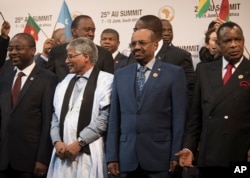International Criminal Court judges asked South Africa on Thursday to send representatives to a hearing next year to determine whether it had breached its obligation to arrest Sudan's President Omar al-Bashir in June.
The public hearing will further strain frayed relations between the war crimes court and African leaders, many of whom accuse the mainly European-backed institution of singling out Africa for prosecution.
The decision of South Africa's President Jacob Zuma to let Bashir depart after an African Union summit unleashed a storm of protest in June, prompting legal challenges against the government and leading indirectly to South Africa's — and later Gambia's — decision to withdraw from the court.
In a ruling issued Thursday, pre-trial judges at the court scheduled a hearing for April 7, at which the court's prosecutor Fatou Bensouda, South Africa's government and the United Nations could discuss the alleged non-compliance.
In 2010, the court charged Bashir with genocide in connection with the conflict in South Sudan. The ICC's arrest warrants are binding on all member states, including South Africa, but in practice Bashir has visited many members, especially in Africa, without being arrested.
South Africa had previously asked the court to suspend its legal action over the visit until all domestic litigation on the matter was complete. The country remains under legal obligation to attend the April hearing despite its planned withdrawal.
More than two-thirds of the court's members are African countries, but a series of politically sensitive cases, particularly those against Kenya's President Uhuru Kenyatta and his deputy, both since shelved, have severely tested Africa's support for the court.
The court has no enforcement powers and no police force of its own. A finding of non-compliance would likely leave any sanctions against South Africa in the hands of the United Nations Security Council, which originally asked the court to investigate alleged war crimes in Sudan.






